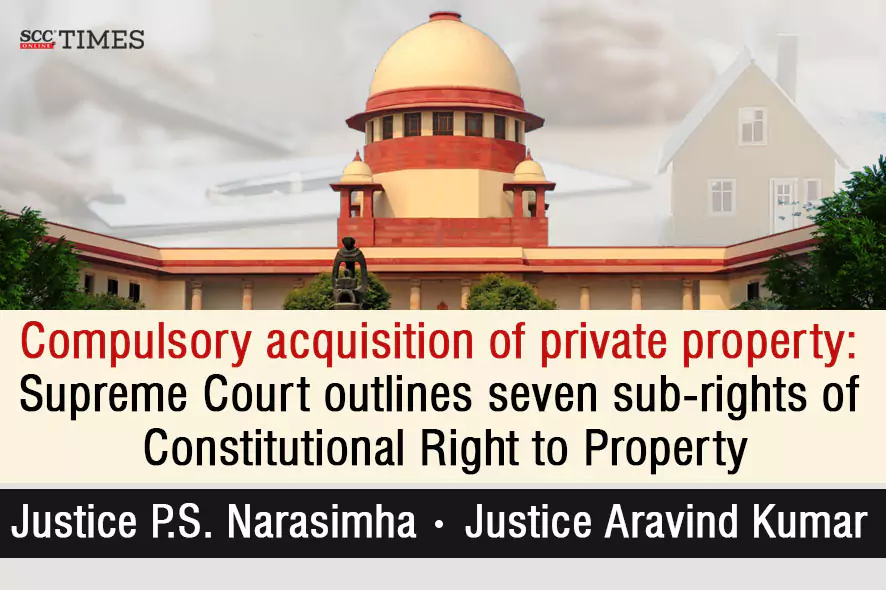Supreme Court: In an appeal filed by the Kolkata Municipal Corporation (‘Corporation’) against the Calcutta High Court Judgment, wherein the Court held that there is no power of compulsory acquisition of immovable property under Section 352 of the Kolkata Municipal Corporation Act, 1980 (‘the Act’), the division bench of PS Narasimha and Aravind Kumar, JJ. has upheld the impugned Judgment. Further, while interpreting “authority of law” in Article 300A of the Constitution, the Bench has held that a minimum content of a constitutional right to property comprises of seven sub-rights or procedures such as the right to notice, hearing, reasons for the decision, to acquire only for public purpose, fair compensation, efficient conduct of the procedure within timelines and finally the conclusion. These sub-rights have synchronously formed part of our laws and have attained judicial recognition. Therefore, as Section 352 does not provide for these sub-rights or procedures, it can never be a valid power of acquisition. Further, the Bench held that Section 352 is only intended to enable the Municipal Commissioner to decide whether a land is to be acquired for public purpose. The power of acquisition is in fact vested with the State under Section 537 and it will exercise it, in its own discretion, whenever the Municipal Commissioner makes an application to that effect.
Analysis and Decision:
After taking note of the Scheme of the Act, and examining Section 352 of the Act, the Court said that Section 352 merely contemplates the power and duty of the Municipal Commissioner to identify the land intended for opening of a street, park etc., and once that decision is taken, the Municipal Commissioner would take steps to acquire such a property. Once the Municipal Commissioner takes the decision to acquire a piece of land, what would then be the process of acquisition is not provided in Section 352 but is provided under Section 535. The phrase ‘Municipal Commissioner may acquire’ in Section 352 is not at all the power of acquisition.
The Court also said that upon application of the Municipal Commissioner under Section 537 for the acquisition of land for opening of a street, square, park etc., the Government may order proceedings to be taken for acquiring land on behalf of the Corporation as if the land is needed for a public purpose within the meaning of the Land Acquisition Act, 1894.
Thus, the scheme of the Act makes it clear that Section 352 empowers the Municipal Commissioner to identify the land required for the purpose of opening of public street, square, park, etc. and under Section 537, the Municipal Commissioner has to apply to the Government to compulsorily acquire the land.
Concerning the contention that there is also a provision for compensation under Section 363 where land is acquired under Section 352, the Court agreed with the High Court that this provision relates to payment of compensation upon an agreement and not for compulsory acquisition.
The Right to property: A net of intersecting rights:
The Court said that under our constitutional scheme, compliance with a fair procedure of law before depriving any person of his immovable property is well entrenched. While it is true that after the 44th Constitutional Amendment, the right to property drifted from Part III to Part XII of the Constitution, there continues to be a potent safety net against arbitrary acquisitions, hasty decision-making and unfair redressal mechanisms. Despite its spatial placement, Article 300A has been characterised both as a constitutional and a human right.
The Court remarked that “to assume that constitutional protection gets constricted to the mandate of a fair compensation would be a disingenuous reading of the text and, shall we say, offensive to the egalitarian spirit of the Constitution”.
The Court said that the binary reading of the constitutional right to property must give way to more meaningful renditions, where the larger right to property is seen as comprising intersecting sub-rights, each with a distinct character but interconnected to constitute the whole. These sub-rights weave themselves into each other, and consequently, State action or the legislation that results in the deprivation of private property must be measured against this constitutional net as a whole, and not just one or many of its strands.
The Court identified the following 7 non-exhaustive sub rights:
-
Right to notice- duty of the State to inform the person that it intends to acquire his property
-
Right to be heard- the duty of the State to hear objections to the acquisition
-
Right to a reasoned decision-the duty of the State to inform the person of its decision to acquire
-
Duty to acquire only for public purpose -the duty of the State to demonstrate that the acquisition is for public purpose
-
Right of restitution or fair compensation- the duty of the State to restitute and rehabilitate
-
Right to an efficient and expeditious process- the duty of the State to conduct the process of acquisition efficiently and within prescribed timelines of the proceedings
-
Right of conclusion-final conclusion of the proceedings leading to vesting
The Court said that these seven rights are foundational components of a law that is tune with Article 300A, and the absence of one of these or some of them would render the law susceptible to challenge. These sub-rights of procedure have been synchronously incorporated in laws concerning compulsory acquisition and are also recognised by our constitutional courts while reviewing administrative actions for compulsory acquisition of private property.
The Court also added that these seven principles are integral to the authority of law enabling compulsory acquisition of private property. Union and State statutes have adopted these principles and incorporated them in different forms in the statutes provisioning compulsory acquisition of immovable property. The importance of these principles, independent of the statutory prescription have been recognised by constitutional courts and they have become part of administrative law jurisprudence.
The Court held that a valid power of acquisition coupled with the provision for fair compensation by itself would not complete and exhaust the power and process of acquisition. Prescription of the necessary procedures, before depriving a person of his property is an integral part of the ‘authority of law’, under Article 300A and, Section 352 of the Act contemplates no procedure.
The Court opined that the High Court was fully justified in allowing the writ petition and rejecting the case of the Corporation acquiring land under Section 352 of the Act. Thus, the Court while dismissing the present appeal with costs quantified at Rs. 5,00,000/-, to be paid to respondent 1 within a period of sixty days from the date of this judgment.
CASE DETAILS
|
Citation: Appellants : Respondents : |
Advocates who appeared in this case For Petitioner(s): For Respondent(s): |
CORAM :










